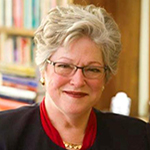 By Molly T. Marshall
By Molly T. Marshall
Since my vocation as a seminary president requires travel and presence in varied congregations, which means irregular attendance at my home church, I volunteered to be a member of the stewardship committee. It meets at times other than Sunday, and I can serve my congregation in this way. Besides, asking for money is how I spend a great deal of my time. Some refer to me as the “importunate widow” who will “wear you out” by her incessant petition (Luke 18:1-8). At times I see male donors backing up to the wall to protect their wallets!
Why would I volunteer to be a part of a committee everyone avoids? We have only three members, and there is room for three more. We have not recruited very well for this essential task of stewardship education, and I fear we are far too squeamish when it comes to talking about money at church. We relegate sermons on stewardship to the fall campaign, and generally we assume that a once a year pledge will entail enough moral conviction to fund the mission of the congregation. I volunteered because I am passionate about cultivating generosity — in myself as well as others.
Recent studies show that the word “tithe” no longer means 10 percent of income but any offering given to the church. Regrettably, many only offer the few dollars left over at month’s end. Of course, people have vastly different capacities to give, and I do not want to be insensitive to those who struggle to provide basic necessities for their families.
Many congregations do not want their pastors to know how much anyone gives. Laypersons presume that somehow clergy care for particular members would be compromised if this information were available to the minister. This suspicion suggests a significant lack of integrity! The senior pastor of the church I served as an associate shortly after completing my master of divinity was adamant about not wanting to know the giving patterns of congregants.
A wise pastor in my region helped my thinking about this. He said that it was very important for him to know what people were giving, for it was an index of their discipleship. If he had this knowledge, he could challenge them to grow in their faith practices. Clearly, our giving does reveal our priorities. The checkbook tells where we locate our treasure and where our hearts reside.
It is an act of radical faith to place our offering alongside the offerings of others to sustain the church’s ministry. No one person controls the budget; the congregation year by year determines it. Each member of the congregation has preferences about where the money goes. I would surely love it if my church had a larger line item to support my seminary!
A church budget calls us to a measure of unselfishness. I think about the elderly in my congregation who may have no familial connection to the youth ministry, yet they give because they find it compelling. Others find supporting American Baptist missionaries directly their priority; others think funding guest musicians for worship takes precedence. Others are aggressive about deferred maintenance; they want to address capital improvements in a timely manner rather than waiting for the next campaign. Each giver has to decenter himself or herself when constructing a comprehensive budget, and this calls us to Christian maturity.
How may a pastor inspire generative giving? My friend Rebekah Burch Basinger has co-authored a significant book titled Growing Givers’ Hearts: Treating Fundraising as Ministry. I find her objectives persuasive. She believes that making faith-building opportunities for givers the first priority, and they can begin to act on their confidence in God’s abundance.
The authors write of their goal: “To bring people into a closer relationship with God through the experiences of giving we help create by offering occasions where giving is consciously evoked as a spiritual act and practice.” Giving deepens the spirit and widens the heart.
Thus when a pastor invites participation in the annual stewardship campaign, he or she must convey that all resources are gifts God has entrusted to us to be used for transformative ministries. The pastor also proclaims how giving transforms the giver.
A firm that helps develop resources for nonprofits delivered a message of hope at a gathering of seminary presidents and deans, for whom fundraising ever looms. Three phrases framed the presentation: 1) There is enough; 2) You can find it; and, 3) Do not be afraid. It was a scintillating message, and it encouraged those of us who daily seek to garner resources to fund our schools. It is a word for congregations, too.
As we head into the season of stewardship, let’s try to remember that it is not all up to us. We can be faithful in our proclamation, encouragement and personal stewardship, and then we can trust God will beckon generous giving from those made after God’s likeness, the Triune One who is bountifully generous.
